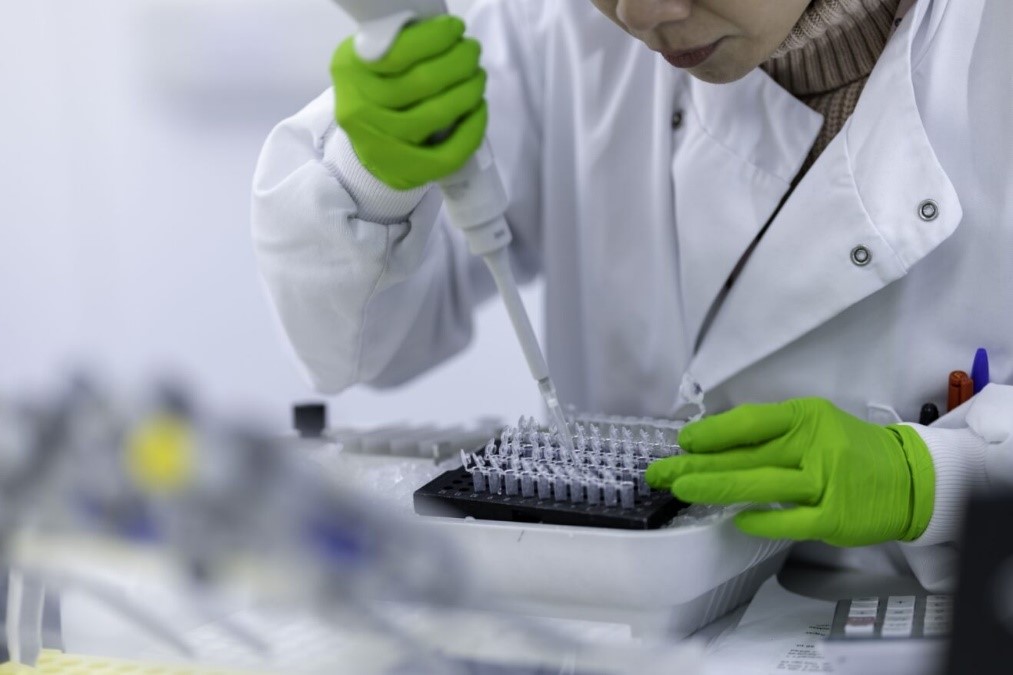
Sodium Salt dNTPs
Not seeing what you’re looking for? Inquire about a new product
PCR Grade Ultra-Pure Nucleotides
- Greater than 99 % purity, ideal for use in qPCR applications
- Free from PCR inhibitors for maximum assay performance
- Enzymatically synthesized from premium quality raw materials
The manufacturing process eliminates impurities and PCR-specific inhibitors such as modified nucleotides, tetraphosphates, and pyrophosphates commonly observed in other commercially available dNTP products (>99% purity determined by quantitative HPLC).
Catalogs & Brochures
Reagent Solutions for Molecular DiagnosticsReagent Solutions for Molecular DiagnosticsCatalog
Next-Generation Sequencing (NGS)Next-Generation Sequencing (NGS)Catalog
qPCR Extraction ControlsqPCR Extraction ControlsCatalog
VLP-RNA Extraction ControlVLP-RNA Extraction ControlCatalog
dNTPsdNTPs (Deoxynucleotide triphosphates)Catalog
Food Safety TestingFood Safety TestingCatalog
Thermostable MMLV-RT55C MMLV-RTCatalog
Glycerol-Free T4 DNA Ligase (HC)Glycerol-Free T4 DNA Ligase (HC)Catalog
Reverse transcriptasesReverse transcriptases Catalog
Glycerol-Free T7 RNA PolymeraseGlycerol-Free T7 RNA Polymerase Catalog
dNTPs or deoxynucleotide triphosphates are the “building blocks” for DNA. Purity and stability of dNTPs are two of the essential factors to achieve a successful PCR. The use of a highly purified dNTP preparation is particularly recommended for sensitive techniques such as long-range PCR, RT-PCR, multiplex PCR, mutagenesis experiments and real-time applications. The purity of dNTPs is also important when the starting amount of template is minimal.
Yes. The sodium salt dNTP products are a standard grade and so we recommend these dNTPs for PCR. For more sophisticated reactions such as amplification of long templates, real-time PCR and NGS, we recommend lithium salt dNTP products.
Yes. The optimal pH for storage of nucleotides is from pH 7.5-8.2 (pH at 20°C). An acidic pH will cause hydrolysis of dNTPs (deoxynucleotide triphosphates) to dNDPs (deoxynucleotide diphosphates) and dNMPs (deoxynucleotide monophosphates), rendering them less suitable for PCR applications. During freezing/thawing cycles, the pH of the dNTP solutions can differ from the pH at 20°C. Sodium salts are temperature sensitive, so care needs to be taken when repeatedly frozen and thawed and sodium salt dNTPs are better aliquoted into smaller volumes and kept frozen in order to extend their shelf life.
The enzymatic synthesis of dNTPs uses highly specific enzymatic systems which eliminate impurities and PCR inhibitors, such as modified nucleotides, PPi and deoxynucleoside tetraphosphates. PCR reactions are impeded by the presence of contaminants resulting from chemical manufacturing processes, such as traces of dNDPs, pyrophosphates or other ionic species (e.g. acetate). Such contamination may lead to poor yields or to no PCR product at all. Unless thoroughly purified, chemically synthesized dNTPs often contain deoxynucleoside tetraphosphates which are powerful PCR inhibitors. Chemical synthesis can also lead to deamination and other nucleotide modifications whereas enzymatic synthesis of dNTPs bypasses these risks.
Get In Touch With A Specialist
Have questions about a product? Want to learn more about Meridian’s molecular or immunoassay reagent portfolio? We want to hear from you!